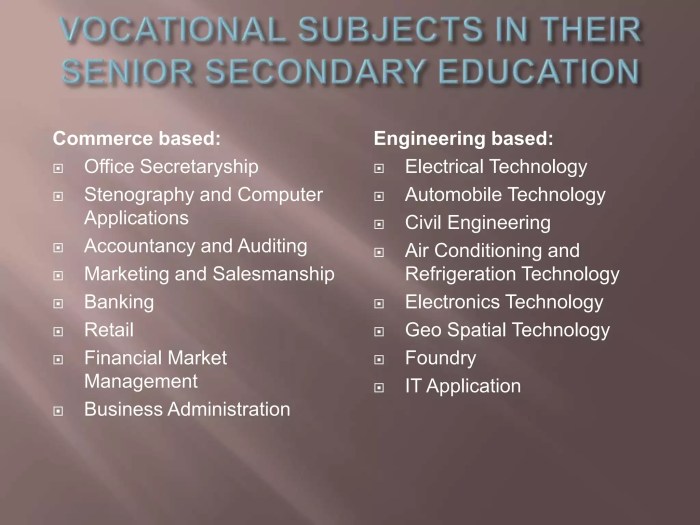With Benefits of vocational education programs at the forefront, this paragraph opens a window to an amazing start and intrigue, inviting readers to embark on a storytelling journey filled with unexpected twists and insights. Vocational education plays a crucial role in shaping successful careers and addressing the skills gap in today’s workforce. Let’s dive into the world of vocational education programs and explore their impact on individuals and industries.
In this exploration, we will uncover the importance of vocational education, the different types of programs available, the skills developed through these programs, and the inspiring success stories that showcase the transformative power of vocational education. Get ready to discover how vocational education programs can pave the way for fulfilling and rewarding career paths.
Importance of Vocational Education Programs

Vocational education programs play a crucial role in today’s workforce by providing students with practical skills and knowledge that are directly applicable to specific industries. These programs offer hands-on training and real-world experience, preparing individuals for successful careers in various fields.
Examples of Successful Vocational Education Programs
- The National FFA Organization: This program focuses on agricultural education and leadership development, equipping students with skills in farming, agribusiness, and environmental management. Graduates of this program often pursue careers in farming, food production, and agricultural technology.
- SkillsUSA: SkillsUSA offers training in trade, technical, and skilled service occupations, helping students develop expertise in areas like automotive technology, construction, and cosmetology. Participants in SkillsUSA competitions showcase their talents and skills, leading to job opportunities and industry recognition.
Impact of Vocational Education Programs on Students’ Careers
Vocational education programs have a direct impact on students’ careers by providing them with the necessary skills to succeed in their chosen field. By gaining hands-on experience and industry-specific knowledge, graduates of these programs are better equipped to secure employment and advance in their professions. Employers often value vocational education due to its focus on practical skills, making graduates highly sought after in the job market.
Bridging the Skills Gap in Various Industries
Vocational education plays a critical role in bridging the skills gap in industries facing shortages of qualified workers. By training students in high-demand fields such as healthcare, information technology, and advanced manufacturing, vocational programs help address workforce shortages and meet the needs of employers. These programs ensure that individuals have the skills and expertise required to fill essential roles, contributing to the overall growth and sustainability of various industries.
Types of Vocational Education Programs: Benefits Of Vocational Education Programs

Vocational education programs offer various pathways for individuals to gain practical skills and knowledge in specific fields, leading to rewarding careers. Let’s explore the different types of vocational education programs available and compare their benefits.
Apprenticeships
Apprenticeships combine on-the-job training with classroom instruction, allowing individuals to learn and earn simultaneously. Apprentices work under the guidance of experienced professionals, gaining hands-on experience in their chosen field. This type of program is ideal for those who prefer learning through practical application and seek mentorship from industry experts.
Technical Schools
Technical schools focus on providing specialized training in a specific trade or vocation, such as automotive technology, culinary arts, or healthcare. These programs offer a more structured curriculum compared to apprenticeships, equipping students with the skills needed to enter the workforce directly after completion. Technical schools are suitable for individuals looking to quickly acquire job-ready skills in a specific industry.
On-the-Job Training
On-the-job training programs allow individuals to learn while working in a real-world setting. Employers provide training to employees on-site, enabling them to acquire job-specific skills and knowledge as they perform their duties. This type of vocational program is beneficial for those who prefer learning through practical experience and seek immediate employment opportunities.Each type of vocational education program caters to different career paths and learning preferences.
Apprenticeships offer a blend of theoretical knowledge and practical skills, making them suitable for hands-on learners. Technical schools provide specialized training in a structured environment, leading to industry-recognized certifications. On-the-job training allows individuals to gain practical experience and valuable skills directly in the workplace, preparing them for immediate entry into the workforce.
Skills Developed in Vocational Education Programs
Vocational education programs are designed to equip students with a wide range of practical skills that are essential for success in the workforce. These programs focus on hands-on training and real-world experience, providing students with the tools they need to excel in their chosen field.
Technical Skills
- One of the key skills that students acquire through vocational education programs is technical proficiency in their chosen field. Whether it’s automotive repair, culinary arts, or computer programming, students learn how to operate specialized equipment and perform specific tasks with precision.
- These technical skills are highly valuable in real-world job scenarios, as employers are always on the lookout for candidates who can hit the ground running and contribute effectively from day one.
Problem-Solving Skills
- In vocational education programs, students are taught how to think critically and solve complex problems that may arise in their field. Whether it’s troubleshooting a malfunctioning machine or finding innovative solutions to improve a process, these problem-solving skills are essential for success in any job.
- By developing their problem-solving skills, students are better equipped to handle challenges in the workplace and make valuable contributions to their employers.
Soft Skills
- In addition to technical and problem-solving skills, vocational education programs also help students develop important soft skills such as communication, teamwork, and time management.
- These soft skills are essential for building strong relationships with colleagues, collaborating effectively on projects, and meeting deadlines in a fast-paced work environment.
Success Stories and Career Outcomes
Vocational education programs have been instrumental in transforming the lives of countless individuals, providing them with the skills and knowledge needed to excel in their chosen fields. Let’s delve into some success stories that highlight the impact of vocational education on career outcomes.
From Vocational Training to Successful Entrepreneurship
One inspiring success story is that of Sarah, who enrolled in a vocational education program focusing on culinary arts. Through hands-on training and industry-relevant skills, Sarah was able to hone her passion for cooking and eventually opened her own successful restaurant. The vocational education program not only equipped her with the technical skills needed in the kitchen but also instilled in her the business acumen to thrive as an entrepreneur.
Career Advancement Through Vocational Education
Another remarkable story is that of John, who decided to pursue a vocational education program in automotive technology. With the practical training and specialized knowledge gained from the program, John secured a job at a reputable car dealership. Over the years, he continued to upskill through advanced vocational courses, eventually landing a supervisory position. The vocational education programs not only enabled John to kickstart his career but also provided a pathway for continuous growth and advancement.
Empowering Individuals for Fulfilling Careers, Benefits of vocational education programs
One more example is the story of Maria, who opted for a vocational education program in graphic design. Through hands-on projects and mentorship from industry professionals, Maria developed a strong portfolio that helped her secure a job at a creative agency. The vocational education program not only empowered Maria with the technical skills in design software but also nurtured her creativity and critical thinking abilities, allowing her to thrive in a dynamic and competitive field.These success stories exemplify how vocational education programs can significantly impact career outcomes, paving the way for individuals to achieve their professional goals and find fulfillment in their chosen paths.